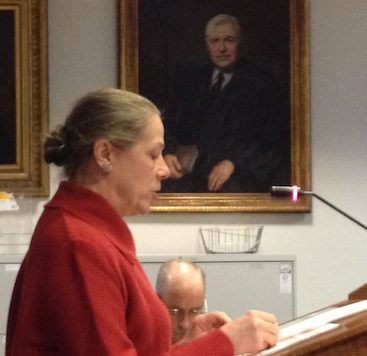If you’re paid to regulate widgets for the state of Maine, then you shouldn’t be able to take a new job working for widget makers.

That’s what Ann Luther, board member of the League of Women Voters of Maine, told legislators on the Veterans and Legal Affairs Committee Wednesday in a hearing on a bill that would stop the so-called “revolving door.” The bill would make it unlawful for executive branch officials to leave their state job and go directly to work for an industry they regulated.
“If I am the state’s regulator of widgets, and I hope for a career in the widget industry after my tenure with the state, my employment prospects may be enhanced by a friendly attitude toward widget makers, regardless of whether a job offer is tendered,” testified Luther.
Luther said her organization supports the bill, which would require a 12-month waiting period between jobs.
The legislation, LD 69, sponsored by state Rep. Adam Goode, D-Bangor, would also expand financial disclosure requirements for state legislators and high level executive branch employees. It reduces the minimum value of gifts that must be disclosed from $300 to $200; requires the disclosure of the annual total value of gifts received; and requires that legislators and executive branch officials make more detailed reports of their outside income.
Current law requires that lawmakers only report sources of income over $2,000 – with no detail about the size of that income.
“This bill changes that reporting to show income ranges that the amount of income falls in,” said Goode in his written testimony on the bill. (Goode couldn’t be at the hearing, so his testimony was delivered by Rep. Louis Luchini, D-Ellsworth.)
Gov. Paul LePage, who will also submit ethics reform legislation this session, supports the expanded disclosure provisions. But he opposes the revolving door provision, said LePage’s representative at the hearing, chief legal counsel Michael Cianchette.
“This creates an unequal situation where lawmakers are free to seek employment in areas where they helped create laws, while executive branch officials would be prohibited from the same,” said Cianchette.
Cianchette claimed that the proposal would, for example, mean that certain employees in the Department of Marine Resources “would be prohibited from clamming,” after their state jobs, while employees from the Department of Environmental Protection “would be prohibited from working as a greeter at Wal-Mart.”
Goode’s bill is one of a growing number of ethics bills to be proposed this session, including new bills in the works from state Rep. Jarrod Crockett, R-Bethel and state Rep. Diane Russell, D-Portland.
Crockett and others said their interest in ethics reform was sparked by a national report last year that gave Maine government an “F” for its potential for corruption.
Maine ranked 46th in the “State Integrity Investigation” by three nonpartisan good government groups that was released in mid-March.
”There’s no reason that a state that has so many honest people as we do, who are known for their independence and integrity, should be getting a grade like that,” Crockett said.
Crockett’s bill, LD 184, addresses the revolving door for legislators.
“There’s no way you are a legislator one day and become a lobbyist the next and not have the look of impropriety,” said Crockett. His bill would establish a 12-month cooling off period before lawmakers could take jobs as lobbyists.
Crockett said the bill would “give people greater faith in government knowing that lobbyists are further removed from the decision-making process.
“The people’s business should be handled with extraordinary care and the outside influences should be kept to a minimum,” he said.
State Rep. Diane Russell, D-Portland, also said Wednesday that she’s preparing another revolving door bill – with stricter rules for both executive branch officials and lobbyists.
“It’s time to close the revolving door,” said Russell. “If you’re a lobbyist you can’t work for the executive (branch) for five years; if you’re in the executive branch, you can’t work as a lobbyist for five years.”
Russell acknowledged her bill was likely to meet resistance, especially because Maine has a part-time, citizen legislature.
“You still have to make money outside of the legislature, so you have to make allowance for that but I still think there’s a lot we can do to give people the confidence that their politicians aren’t being bought and paid for.”
Goode’s bill faces another roadblock: No one is designated to enforce the revolving door rule.
There’s no agency that currently has responsibility for policing executive branch ethics rules. The state’s Commission on Governmental Ethics is responsible for receiving disclosure statements from high-level executive officials, but has no further responsibility to oversee that branch’s ethics.
“I don’t know who would administer this,” said Jonathan Wayne, the Ethics Commission’s director.
Disclosure: Ann Luther is a member of the Maine Center for Public Interest Reporting’s board of directors.









